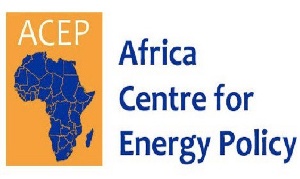 Logo of Africa Centre for Energy Policy (ACEP)
Logo of Africa Centre for Energy Policy (ACEP)
The Africa Centre for Energy Policy (ACEP), is urging Ghanaians to rise up against Millennium Development Authority (MiDA) and government for not engaging them on the ECG Concession for their interest to be factored in the deal.
ACEP argues “One thorny aspect of the concession was the injection of 51% local content demands” wondering why MiDA and government have simply failed to engage the public on that “most crucial aspects of the concession.”
According to ACEP’s Radar, the energy Think-Tank is interested in broader engagement on the key deliverables of the concession to ensure that they are crisp and concise targets that are easy to track and measure.
“We need to know how the company is achieving its targets as may be agreed. This has to be published to allow independent analysis of the data and how it translates into savings for the public as intended. Sanctions for nonperformance are clear and known to the public. Let the public know what sanctions apply to any missed deliverable,” it demanded.
It reminded MiDA and government that there will be a mountain of resistance if stakeholders are not clear that the PSP represents the best interest of the Ghanaians
Cabinet, according to the CEO of Millennium Development Authority, Martin Esson Benjamin has approved the takeover of ECG by Meralco Consortium pending approval of Parliament to seal the deal.
Although ACEP said, it does not doubt the competency of Meralco to manage the ECG, it expressed worry about why Meralco Consortium has not disclosed its local partners.
“Meralco, has not indicated who its local partner(s) is/are, as MiDA has not disclosed anywhere that the 51% local participation in the approved bid has been taken up by a local entity. This fuels the speculation that Meralco is still looking for the local partner. If it is true that the winner of the bid did not have 51% local content prior to winning the bid, how fair then was the process to those companies who dropped o? because of the local content demands? ACEP quizzed.
ACEP wants Ghanaians to focus on and ?ght for their interest in the deal through a shared understanding of the risks expected gains and the processes.
It contends that the processes leading to the selection of Meralco Consortium is nothing but an apostolic representation by MiDA and Government on behalf of the broader society.